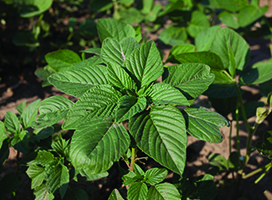 Palmer amaranth is a name that strikes dread in the hearts of farmers across the Corn Belt. The weed is hardy and hard to control. Palmer amaranth is also known to be aggressive, an idea backed up by the research of an Illinois college professor and his students.
Palmer amaranth is a name that strikes dread in the hearts of farmers across the Corn Belt. The weed is hardy and hard to control. Palmer amaranth is also known to be aggressive, an idea backed up by the research of an Illinois college professor and his students.
Mark Bernards is an associate professor of agronomy, crop science and weed control at Western Illinois University. Bernards and his weed science class conducted research to learn about growth of two common weeds. The group compared the development of Palmer amaranth with waterhemp plants as they grew in the same pot and had to compete. The result? Palmer amaranth grew more aggressively than waterhemp.
“One of the things we noticed is that Palmer amaranth adds leaves a lot quicker,” Bernards says. “At the end, Palmer amaranth had 17 to 18 leaves per pot whereas waterhemp had somewhere between 13 and 14. Palmer amaranth is a much more aggressive species.”
Whether your concern last year was Palmer amaranth, waterhemp or giant ragweed, you can implement helpful practices to control herbicide-resistant weeds in the future. Bernards says the two best ways to delay, or prevent, herbicide resistance is to apply herbicide mixtures that have active ingredients effective on the targeted weeds and to overlap residual herbicides with multiple modes of action.
“Our primary focus needs to be eliminating weed seed return, which means we don’t let any new weeds into our fields,” Bernards says. “A preemergence application followed by a post is critical for herbicide resistance management.”
Using a preemergence herbicide helps protect yield potential early. Following up with a postemergence herbicide will not only provide additional control but also help you navigate unfavorable weather circumstances.
Farmers need a powerful herbicide program to fend off Palmer amaranth next season. An example of a strong approach is applying SureStart® II herbicide preemergence followed by Resicore® herbicide for four modes of action that will work deep into the season. Many farmers also choose to add glyphosate and atrazine to this program to increase the number of modes of action.
For more information about Resicore and SureStart II herbicides and controlling herbicide-resistant weeds, including Palmer amaranth, visit the Corn Herbicides Portfolio Page on Corteva.us.
™ ® Trademarks of Dow AgroSciences, DuPont or Pioneer, and their affiliated companies or their respective owners. Resicore and SureStart II are not registered for sale or use in all states. Resicore and SureStart II are not registered for sale, distribution or use in Nassau and Suffolk counties in the state of New York. Contact your state pesticide regulatory agency to determine if a product is registered for sale or use in your state. Always read and follow label directions. © 2019 Corteva.
The More You Grow
Find expert insights on agronomics, crop protection, farm operations and more.